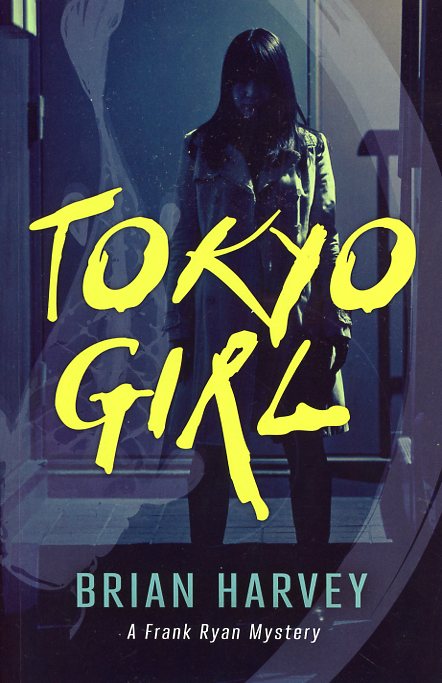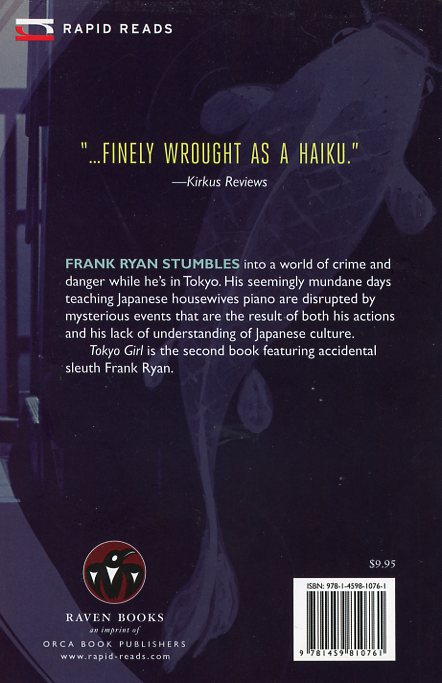
|

|
|
Brian Harvey, Tokyo Girl, 2016
Click on back cover to enlarge
Yosha Bunko scans
Trigger warning
"finely wrought as a haiku"
is hyperbole
|
Brian Harvey
Tokyo Girl
A Frank Ryan Mystery
Canada: Raven Books (Orca Book Publishers), 2016
137 pages, paper cover
Weighing roughly 160 words per page, this book -- in the publisher's "Rapid Reads" series -- would flesh out half an ordinary book its size, or a quarter of a typical novel. Which makes it a novella that a super fast reader might knock off in 10 minutes. It took me an hour because I move my lips. I could recite it out loud in two hours, and the audience that hadn't fallen asleep by the end of the first chapter would walk out during the second.
Frank Ryan was a jazz pianist at a club in Nanaimo when his involvement in a mystery ired some elements, the thought of whom terrified him so much that he bought a ticket from Vancouver to Tokyo. He had a tourist visa, but set out to support himself by teaching housewives and other women to play classical piano.
One of his more talented and puzzling students was a seemingly wealthy girl named Akiko, who apparently had no job. "But somebody must have paid for the cosmetic surgery that had given her that narrow nose and those Western-looking eyes" (page 8).
Every time he left Akiko's house, Ryan wondered why he was in Japan. So he took time to tell us. He arrived in Tokyo at the end of March (page 11).
It was just two weeks after an earthquake under the Pacific Ocean had driven a thirty-foot wall of water -- a tsunami -- through the coastal city of Fukushima. The tidal wave hurdled a seawall. It tossed freighters and ferries ashore like bathtub toys and left buses on hospital roofs. And it turned a nuclear power plant into a leaking, radioactive time bomb.
Fukushima city is about 40 kilometers from the coast. Tidal waves toss nothing. And only one bus ended up on the roof of only one hospital -- in Ishinomaki city on the coast of Miyagi prefecture to the north, which was hit by tsunami as high as 10 meters.
I felt like stopping but had to read as far as the start of the plot.
One day, Akiko was tense, and Ryan took one of her locked wrists in his fingers and urged her to let go and not stop playing. But she stopped, as someone else was in the room -- a guy who was "big for a Japanese man" -- and, when he took off his sunglasses, Ryan saw that "Nobody had done any surgery on this guy's eyes. There were like slits. I wondered how he could see at all" (page 19).
Ryan likens himself and Akiko to sardines, and likened the man -- gaudily dressed and regarding them with a "protruding lower lip" -- to a barracuda.
Akiko introduced the man as her father and explains to him that Ryan was her piano teacher. They men shake hands, and Ryan tells us what that was like (page 19).
Jeweled rings dug into my palm. I wondered which of them had caught Akiko on the eyeball. He didn't have a ring on his little finger because his little finger was missing."
"Hajimemashite," Ryan says, and tells us that he was "pretty sure" it meant "nice to meet you".
So we're getting somewhere. 15 percent into the book, and I've learned a second Japanese word. The first was gaijin -- a foreigner" (page 4). Harvey was kind enough to italicize them so I'd be sure to see them.
Akiko and her father talk -- argue about something -- and Akiko asks Ryan to play something quiet. He plays the Chopin prelude Akiko was working on. The man grunts. Akiko translates -- he prefers jazz. Ryan says he does do. Akiko, surprised, tells the man, who comes over to the piano and says, in English, "You know 'My Funny Valentine'?"
After Ryan's torrential performance, the man and Akiko talk again, this time more calmly. Akiko tells Ryan the man has a job for him. It seems one of the clubs he owns, which happens to be in Ryan's neighborhood, needs a late-night jazz pianist.
Ryan find's the coincidence a bit odd, but is interested. He has one question, though -- "What happened to the other piano player?" Akiko translates this for the man, who laughs, and Akiko translates his reply -- "A problem with one of his fingers" (page 23).
Now you know where the story is going. The pace picks up and the plot twists.
For $9.95 (US or Canadian?), you can find out who done what to whom, where and when, and you can speculate why.
The 2015 prequel -- Beethoven's Tenth, also published by Rapid Reads -- is billed as a "smart page-turner".
|